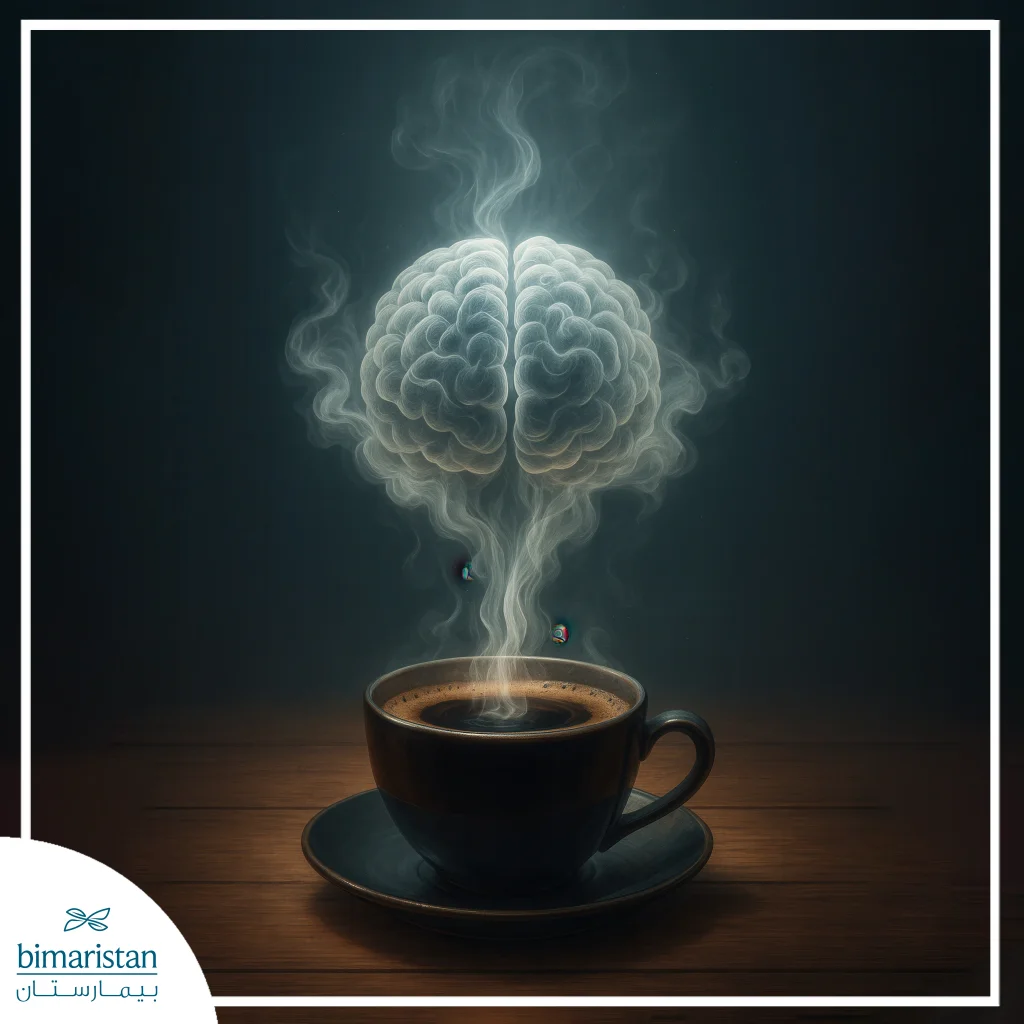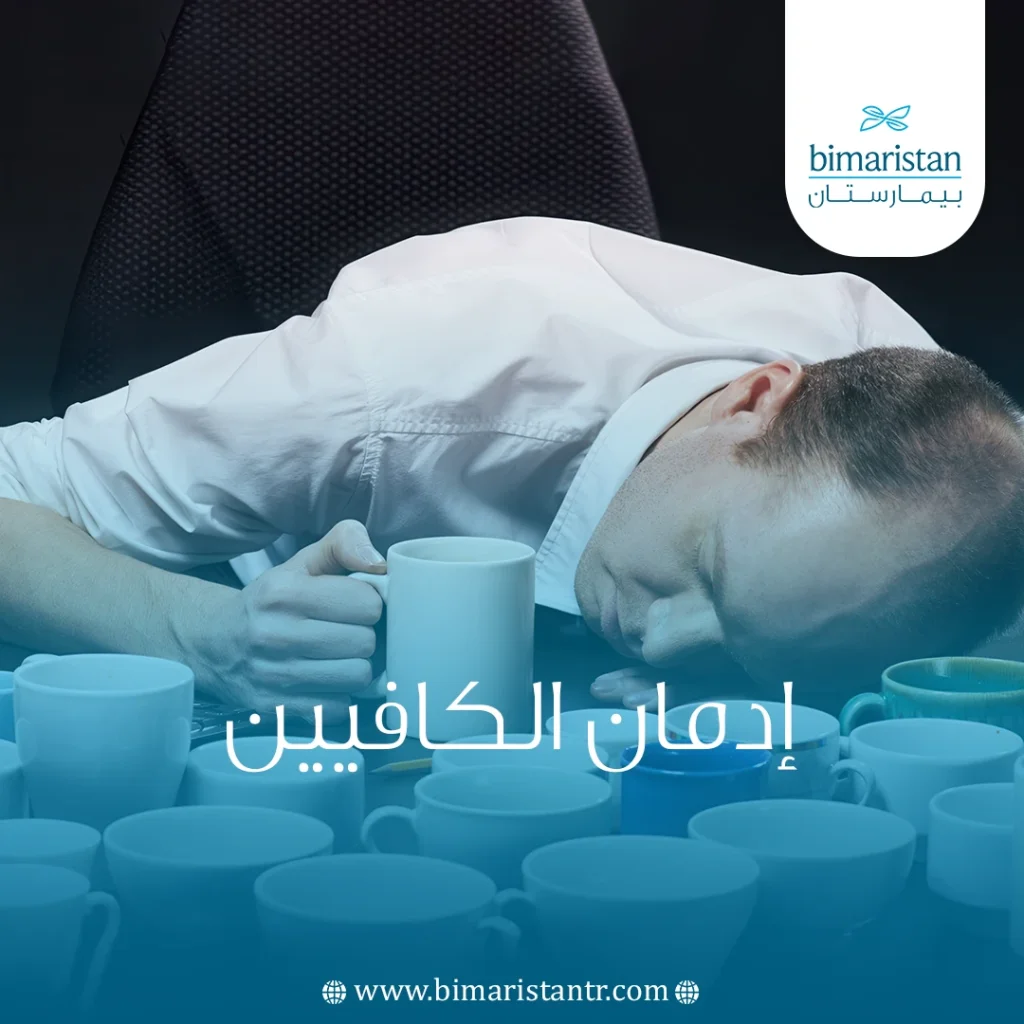يعد إدمان الكافيين من الظواهر المنتشرة عالمياً وخاصة في المجتمعات التي تعتمد على المشروبات المنبهة كجزء من روتينها اليومي، مثلاً في أوروبا قد تبين أن استهلاك الكافيين وصل إلى مستويات مرتفعة حيث تجاوز الاستهلاك اليومي للفرد 300 ملغ في بعض الدول وكذلك في تركيا خصوصاً تظهر أيضاً الإحصاءات تزايداً ملحوظاً في استهلاك القهوة والشاي، مما يبين لنا مؤشر وتحذير بسبب هذا الإدمان. يعكس هذا الانتشار الحاجة إلى فهم أعمق لتأثيراته على السلوك والصحة العامة.
ما هو إدمان الكافيين؟
إدمان الكافيين هو حالة من الاعتماد الجسدي والنفسي على الكافيين الموجود في القهوة والشاي وكذلك مشروبات الطاقة وبعض الأدوية بحيث يصعب على الشخص بدء يومه أو التركيز دونه وغالباً ما يؤدي التوقف المفاجئ عن تناول الكافيين إلى ظهور أعراض انسحابية مثل الصداع والتعب والتوتر العصبي التي تتفاقم بسرعة، كما قد يؤدي إلى تفاقم بعض الأعراض الهضمية لدى مرضى القولون التقرحي.

لماذا يسبب الكافيين الإدمان؟
الكافيين يسبب الإدمان لأنه يثبط ارتباط الأدينوزين بمستقبلاته وهو المركب الذي يسبب النعاس وهذا الأمر يزيد نشاط الدماغ ويحفز إفراز الدوبامين. مع الاستهلاك المستمر يتكيف الجسم بزيادة مستقبلات الأدينوزين فيصبح الجسم بحاجة إلىجرعات أكبر للشعور بنفس التأثير، هذه الٱلية مع الوقت تؤدي إلى اعتماد جسدي ونفسي، رغم أنه أقل شدة من الإدمان على المخدرات إلا أن الاعتماد عليه شائع جداً.
علامات تشير إلى أنك مدمن كافيين
يُعتبر إدمان الكافيين شكلاً من أشكال الإدمان النفسي والجسدي حيث تظهر على الفرد مجموعة من الأعراض عند انخفاض مستواه في الجسم ويعتبر التعرف أو الكشف على هذه العلامات أهم خطوة لتقييم مستوى الاعتماد واتخاذ قرار بالتقليل أو الإقلاع، من أهم هذه العلامات:
- الصداع عند عدم تناول القهوة
- التهيج أو العصبية الزائدة
- الاعتماد اليومي على الكافيين للتركيز
- الأرق أو اضطرابات النوم
- زيادة خفقان القلب وارتفاع ضغط الدم
- زيادة القلق والتوتر الذي قد يتداخل أو يؤدي إلى نوبات اكتئاب
- مشاكل هضمية مثل الحموضة
- زيادة الحاجة للكافيين بمرور الوقت
كيف أتخلص من إدمان الكافيين تدريجياً؟
يعتبر إدمان الكافيين حالة يمكن التعامل معها بفعالية من خلال خطوات تدريجية ومدروسة، تعمل هذه الخطوات على تقليل الاعتماد الجسدي والنفسي من الكافيين. إنّ اتباع هذه الأساليب يساعد في تقليل الأعراض الانسحابية وتحقيق توازن صحي دون التأثير على مستوى الطاقة والتركيز ومن أهم هذه الأساليب:
- تقليل الكمية اليومية تدريجياً: وذلك عبر خفض استهلاك الكافيين بشكل تدريجي حيث تقلل هذه الآلية من أعراض الانسحاب مثل الصداع والتعب، على سبيل المثال يمكن للمدمن التقليل من عدد أكواب القهوة أو اختيار أحجام أصغر.
- استبدال القهوة بمشروبات عشبية: استخدام مشروبات خالية من الكافيين مثل الشاي العشبي أو القهوة منزوعة الكافيين جزئياً حيث يساعد هذا الأمر في تقليل الاعتماد على الكافيين.
- شرب الماء بكثرة: وذلك من أجل الحفاظ على رطوبة الجسم وتخفيف أعراض الانسحاب وتحسين وظائف الجسم العامة.
- النوم الجيد وممارسة الرياضة: إنّ تحسين جودة النوم وممارسة التمارين الرياضية بانتظام تعزز من مستويات الطاقة وتقلل من الشعور بالحاجة إلى الكافيين.
هل توجد بدائل صحية للكافيين؟
عند التقليل من استهلاك الكافيين أو التوقف عنه يحتاج البعض إلى بدائل صحية تساعدهم على الحفاظ على النشاط والتركيز، هناك عدة خيارات طبيعية يمكن أن تؤدي هذا الدور دون التسبب في آثار جانبية مثل الأرق أو القلق ومنها:
- شاي الأعشاب (النعناع، البابونج): لا يحتوي على الكافيين ويساعد على الاسترخاء وتحسين النوم (البابونج) أو تهدئة المعدة (النعناع) ويعد بديلاً ممتازاً للمشروبات المنبهة الحاوية على الكافيين.
- العصائر الطبيعية: توفر طاقة طبيعية من السكريات والفيتامينات دون كافيين وتساعد في تقليل الاعتماد على القهوة.
- التمارين الخفيفة: الأنشطة الرياضية البسيطة كالمشي أو التمدد تحسن من قدرة التركيز وتحسن المزاج بدون الحاجة للمنبهات.
إنّ تقليل الكافيين لا يعني فقدان النشاط أو التركيز بل يمكن تعويضه بخيارات طبيعية وصحية تساعد الجسم على استعادة توازنه حيث الاعتماد على نمط حياة متوازن يتضمن التغذية الجيدة والنوم الكافي والنشاط البدني المنتظم يسهم بشكل فعّال في تحسين طاقة الجسم والمزاج، يجب البدأ بخطوات بسيطة ومدروسة وسيلاحظ الشخص تراجع اعتماده على المنبهات تدريجياً مع تحسن في جودة حياته اليومية.
المصادر:
- Meredith, S. E., Juliano, L. M., Hughes, J. R., & Griffiths, R. R. (2013). Caffeine use disorder: A comprehensive review and reearch agenda. Journal of Caffeine Research, 3(3), 114–130.
- Novotney, A. (2015, November). Too much coffee? *gradPSYCH Magazine *. American Psychological Association.
